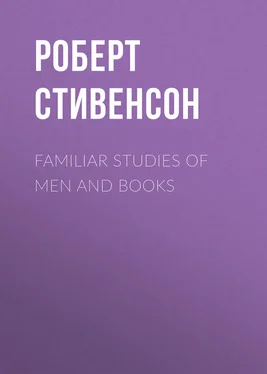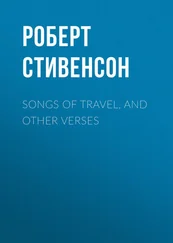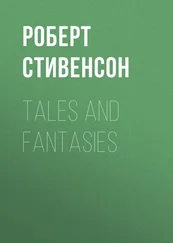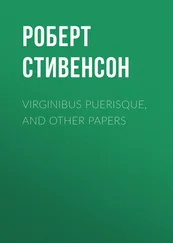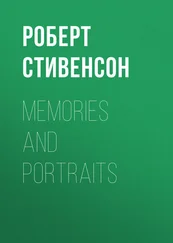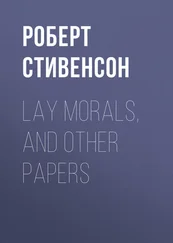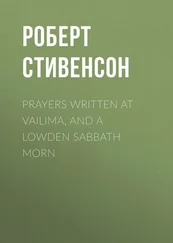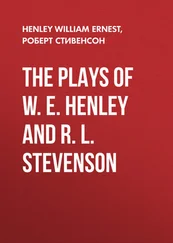Роберт Стивенсон - Familiar Studies of Men and Books
Здесь есть возможность читать онлайн «Роберт Стивенсон - Familiar Studies of Men and Books» — ознакомительный отрывок электронной книги совершенно бесплатно, а после прочтения отрывка купить полную версию. В некоторых случаях можно слушать аудио, скачать через торрент в формате fb2 и присутствует краткое содержание. Жанр: foreign_home, literature_19, на английском языке. Описание произведения, (предисловие) а так же отзывы посетителей доступны на портале библиотеки ЛибКат.
- Название:Familiar Studies of Men and Books
- Автор:
- Жанр:
- Год:неизвестен
- ISBN:нет данных
- Рейтинг книги:3 / 5. Голосов: 1
-
Избранное:Добавить в избранное
- Отзывы:
-
Ваша оценка:
- 60
- 1
- 2
- 3
- 4
- 5
Familiar Studies of Men and Books: краткое содержание, описание и аннотация
Предлагаем к чтению аннотацию, описание, краткое содержание или предисловие (зависит от того, что написал сам автор книги «Familiar Studies of Men and Books»). Если вы не нашли необходимую информацию о книге — напишите в комментариях, мы постараемся отыскать её.
Familiar Studies of Men and Books — читать онлайн ознакомительный отрывок
Ниже представлен текст книги, разбитый по страницам. Система сохранения места последней прочитанной страницы, позволяет с удобством читать онлайн бесплатно книгу «Familiar Studies of Men and Books», без необходимости каждый раз заново искать на чём Вы остановились. Поставьте закладку, и сможете в любой момент перейти на страницу, на которой закончили чтение.
Интервал:
Закладка:
This touches the difference between Fielding and Scott. In the work of the latter, true to his character of a modern and a romantic, we become suddenly conscious of the background. Fielding, on the other hand, although he had recognised that the novel was nothing else than an epic in prose, wrote in the spirit not of the epic, but of the drama. This is not, of course, to say that the drama was in any way incapable of a regeneration similar in kind to that of which I am now speaking with regard to the novel. The notorious contrary fact is sufficient to guard the reader against such a misconstruction. All that is meant is, that Fielding remained ignorant of certain capabilities which the novel possesses over the drama; or, at least, neglected and did not develop them. To the end he continued to see things as a playwright sees them. The world with which he dealt, the world he had realised for himself and sought to realise and set before his readers, was a world of exclusively human interest. As for landscape, he was content to underline stage directions, as it might be done in a play-book: Tom and Molly retire into a practicable wood. As for nationality and public sentiment, it is curious enough to think that Tom Jones is laid in the year forty-five, and that the only use he makes of the rebellion is to throw a troop of soldiers into his hero’s way. It is most really important, however, to remark the change which has been introduced into the conception of character by the beginning of the romantic movement and the consequent introduction into fiction of a vast amount of new material. Fielding tells us as much as he thought necessary to account for the actions of his creatures; he thought that each of these actions could be decomposed on the spot into a few simple personal elements, as we decompose a force in a question of abstract dynamics. The larger motives are all unknown to him; he had not understood that the nature of the landscape or the spirit of the times could be for anything in a story; and so, naturally and rightly, he said nothing about them. But Scott’s instinct, the instinct of the man of an age profoundly different, taught him otherwise; and, in his work, the individual characters begin to occupy a comparatively small proportion of that canvas on which armies manœuvre, and great hills pile themselves upon each other’s shoulders. Fielding’s characters were always great to the full stature of a perfectly arbitrary will. Already in Scott we begin to have a sense of the subtle influences that moderate and qualify a man’s personality; that personality is no longer thrown out in unnatural isolation, but is resumed into its place in the constitution of things.
It is this change in the manner of regarding men and their actions first exhibited in romance, that has since renewed and vivified history. For art precedes philosophy and even science. People must have noticed things and interested themselves in them before they begin to debate upon their causes or influence. And it is in this way that art is the pioneer of knowledge; those predilections of the artist he knows not why, those irrational acceptations and recognitions, reclaim, out of the world that we have not yet realised, ever another and another corner; and after the facts have been thus vividly brought before us and have had time to settle and arrange themselves in our minds, some day there will be found the man of science to stand up and give the explanation. Scott took an interest in many things in which Fielding took none; and for this reason, and no other, he introduced them into his romances. If he had been told what would be the nature of the movement that he was so lightly initiating, he would have been very incredulous and not a little scandalised. At the time when he wrote, the real drift of this new manner of pleasing people in fiction was not yet apparent; and, even now, it is only by looking at the romances of Victor Hugo that we are enabled to form any proper judgment in the matter. These books are not only descended by ordinary generation from the Waverley novels, but it is in them chiefly that we shall find the revolutionary tradition of Scott carried farther that we shall find Scott himself, in so far as regards his conception of prose fiction and its purposes, surpassed in his own spirit, instead of tamely followed. We have here, as I said before, a line of literary tendency produced, and by this production definitely separated from others. When we come to Hugo, we see that the deviation, which seemed slight enough and not very serious between Scott and Fielding, is indeed such a great gulph in thought and sentiment as only successive generations can pass over: and it is but natural that one of the chief advances that Hugo has made upon Scott is an advance in self-consciousness. Both men follow the same road; but where the one went blindly and carelessly, the other advances with all deliberation and forethought. There never was artist much more unconscious than Scott; and there have been not many more conscious than Hugo. The passage at the head of these pages shows how organically he had understood the nature of his own changes. He has, underlying each of the five great romances (which alone I purpose here to examine), two deliberate designs: one artistic, the other consciously ethical and intellectual. This is a man living in a different world from Scott, who professes sturdily (in one of his introductions) that he does not believe in novels having any moral influence at all; but still Hugo is too much of an artist to let himself be hampered by his dogmas; and the truth is that the artistic result seems, in at least one great instance, to have very little connection with the other, or directly ethical result.
The artistic result of a romance, what is left upon the memory by any really powerful and artistic novel, is something so complicated and refined that it is difficult to put a name upon it and yet something as simple as nature. These two propositions may seem mutually destructive, but they are so only in appearance. The fact is that art is working far ahead of language as well as of science, realising for us, by all manner of suggestions and exaggerations, effects for which as yet we have no direct name; nay, for which we may never perhaps have a direct name, for the reason that these effects do not enter very largely into the necessities of life. Hence alone is that suspicion of vagueness that often hangs about the purpose of a romance: it is clear enough to us in thought; but we are not used to consider anything clear until we are able to formulate it in words, and analytical language has not been sufficiently shaped to that end. We all know this difficulty in the case of a picture, simple and strong as may be the impression that it has left with us; and it is only because language is the medium of romance, that we are prevented from seeing that the two cases are the same. It is not that there is anything blurred or indefinite in the impression left with us, it is just because the impression is so very definite after its own kind, that we find it hard to fit it exactly with the expressions of our philosophical speech.
It is this idea which underlies and issues from a romance, this something which it is the function of that form of art to create, this epical value, that I propose chiefly to seek and, as far as may be, to throw into relief, in the present study. It is thus, I believe, that we shall see most clearly the great stride that Hugo has taken beyond his predecessors, and how, no longer content with expressing more or less abstract relations of man to man, he has set before himself the task of realising, in the language of romance, much of the involution of our complicated lives.
This epical value is not to be found, let it be understood, in every so-called novel. The great majority are not works of art in anything but a very secondary signification. One might almost number on one’s fingers the works in which such a supreme artistic intention has been in any way superior to the other and lesser aims, themselves more or less artistic, that generally go hand in hand with it in the conception of prose romance. The purely critical spirit is, in most novels, paramount. At the present moment we can recall one man only, for whose works it would have been equally possible to accomplish our present design: and that man is Hawthorne. There is a unity, an unwavering creative purpose, about some at least of Hawthorne’s romances, that impresses itself on the most indifferent reader; and the very restrictions and weaknesses of the man served perhaps to strengthen the vivid and single impression of his works. There is nothing of this kind in Hugo: unity, if he attains to it, is indeed unity out of multitude; and it is the wonderful power of subordination and synthesis thus displayed, that gives us the measure of his talent. No amount of mere discussion and statement, such as this, could give a just conception of the greatness of this power. It must be felt in the books themselves, and all that can be done in the present essay is to recall to the reader the more general features of each of the five great romances, hurriedly and imperfectly, as space will permit, and rather as a suggestion than anything more complete.
Читать дальшеИнтервал:
Закладка:
Похожие книги на «Familiar Studies of Men and Books»
Представляем Вашему вниманию похожие книги на «Familiar Studies of Men and Books» списком для выбора. Мы отобрали схожую по названию и смыслу литературу в надежде предоставить читателям больше вариантов отыскать новые, интересные, ещё непрочитанные произведения.
Обсуждение, отзывы о книге «Familiar Studies of Men and Books» и просто собственные мнения читателей. Оставьте ваши комментарии, напишите, что Вы думаете о произведении, его смысле или главных героях. Укажите что конкретно понравилось, а что нет, и почему Вы так считаете.
